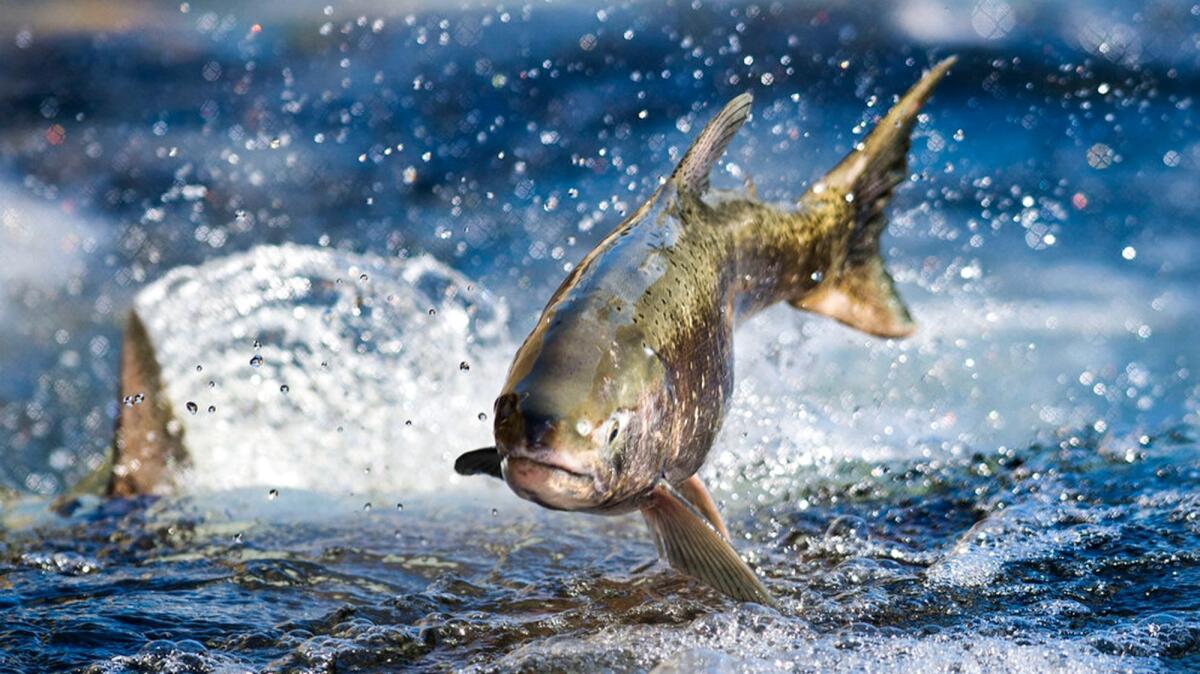California’s species are in danger from Trump. Let’s save them

- Share via
California has its own laws to protect endangered plants and animals from extinction, and they are more important than ever as the Trump administration weakens enforcement of the landmark federal Endangered Species Act. But those state protections will mean little without additional action in Sacramento, where the real issue is water.
The U.S. Interior Department on Aug. 12 altered rules that will now make it harder to protect species. In deciding whether to add a species to the list, for example, federal regulators won’t be able to consider the very profound effect of climate change — which President Trump notoriously has claimed was invented by China to undermine U.S. manufacturing.
The new rules also make it more difficult to protect critical habitats, and for the first time they allow regulators to consider the cost to industry of preserving species, rather than focusing solely on the scientific data that indicate how close affected animals or plants are to extinction.
In California, where it sometimes seems that everything comes down to the use and cost of water, large water agencies are embracing the weaker rules because they see them as an opportunity to divert more snowmelt and river flows to thirsty crops without worrying about the effect on endangered or threatened fish and other animals.
But this state’s environmental protection laws are even older than their federal counterparts. Lawmakers here began enacting laws to protect wildlife early in the 20th century and ultimately adopted the California Endangered Species Act in 1970. CESA provides a thorough, science-based process for determining which species require state protection. It has resulted in the listing of more than 100 animals and plants.
But much of the work to apply the law — researching threats and seeking state protections — stopped after Congress passed and President Nixon signed the federal Endangered Species Act in 1973. There seemed little need to duplicate the process on the state level if an animal or plant was to be protected under federal law. The bald eagle, the California condor and the grizzly bear survive in large part due to the federal law, along with hundreds of other species.
Updating the state’s list of protected species now to make up for the Trump rollbacks would require years of work. In the intervening time, the damage done could be great.
So some lawmakers proposed a simple and brilliant solution: Adopt as California law the level of protection that existed under federal law before Trump took office. A bill to do just that — Senate Bill 1 — is moving through the legislative process.
In addition to “borrowing” protections provided by the federal Endangered Species Act, it would also apply as state standards the federal protections in several landmark environmental laws, including the Clean Air Act, the Clean Water Act and the Safe Drinking Water Act.
The bill is opposed by some water agencies, as well as business groups that tend to view any kind of environmental protections as “job killers.” But it’s hard to see how fouling rivers and streams, diverting water and taking other actions to harm birds, fish and other animals helps employ Californians.
Meanwhile, California’s water board proposed rules to require agricultural water contractors to divert less water from four key migrating salmon highways — rivers that flow from the Sierra Nevada to the Sacramento-San Joaquin River Delta, San Francisco Bay and ultimately the Pacific. Agricultural water contractors are trying to negotiate agreements that protect the fish but allow them to keep up their deliveries to farms and fields. Some have argued that SB 1 undermines those negotiations.
The opposite is true. The bill’s opponents know that the Trump administration is trying to weaken state environmental standards that apply to federal irrigation projects in California. If SB 1 becomes law, water contractors will have an incentive to stay at the table and keep negotiating in good faith.
California Atty. Gen. Xavier Becerra said he might sue Trump to challenge the new Endangered Species Act rules, and that would be fine with us. But the Legislature could do more, sooner, by sending SB 1 to Gov. Gavin Newsom’s desk.
More to Read
A cure for the common opinion
Get thought-provoking perspectives with our weekly newsletter.
You may occasionally receive promotional content from the Los Angeles Times.









